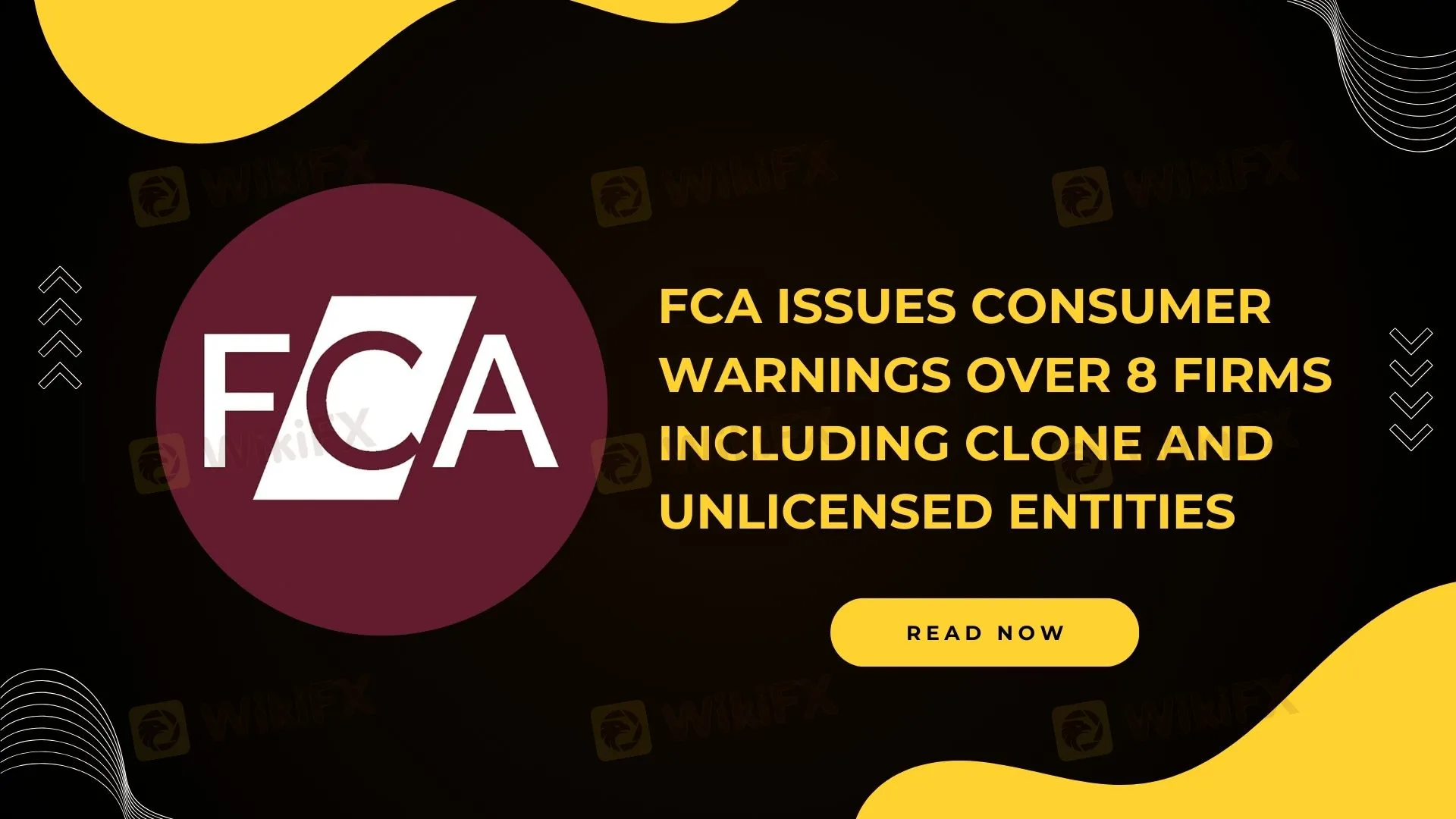简体中文
繁體中文
English
Pусский
日本語
ภาษาไทย
Tiếng Việt
Bahasa Indonesia
Español
हिन्दी
Filippiiniläinen
Français
Deutsch
Português
Türkçe
한국어
العربية
FCA Issues Consumer Warnings Over 8 Firms Including Clone and Unlicensed Entities
Abstract:The UK regulator has identified eight firms using deceptive tactics, including fake credentials and copycat websites, to offer unauthorised financial services to the public.

The UK Financial Conduct Authority (FCA) has issued a set of warnings against eight firms found to be offering financial services in the UK without proper authorisation. Among the entities flagged are both unlicensed operators and so-called “clone firms,” which fraudulently impersonate legitimate, FCA-authorised businesses to deceive consumers.
According to the FCA, clone firms are particularly deceptive because they often use names, addresses, registration numbers, or email domains that closely resemble real firms. In some cases, scammers may even direct consumers to fake websites that appear professional and legitimate. Once contact is established, victims are typically persuaded to transfer funds, thinking they are dealing with a regulated company.
The eight companies named in the latest warning include:
- Premium Loan / premiumloans.org – Clone of Premier Loans Ltd
- foundingassetmgt.com – Clone of Founding Asset Management Limited
- Believe Loan / believeloan.co.uk – Unauthorised lender
- RENDELMAN-JENNINGS CORPORATE LLC – Unregistered firm operating internationally
- Solpension AI / webtrader.solpension.co – Unlicensed platform promoting investment products
- Gavel Trades / gaveltrades.com – Unregulated financial platform
- Audacity Capital / audacitycapital.trade – Unauthorized trading website
- SONIX / sonixtrades.org – Platform offering services without FCA oversight
These firms, often appearing credible at first glance, commonly advertise through search engines, social media, or unsolicited emails. Their tactics may involve high-pressure sales techniques, guarantees of unrealistic returns, or limited-time offers meant to push users into rapid decisions. Once an investor transfers funds, it becomes exceedingly difficult to recover the money—especially when the firms operate offshore or lack any physical presence in the UK.
The FCA reminds consumers that dealing with unauthorised firms comes with significant risk. Victims of scams involving such entities are not eligible for support from the Financial Ombudsman Service or the Financial Services Compensation Scheme (FSCS), meaning financial losses are often irreversible.
Furthermore, the FCA urges financial professionals, journalists, and digital advertisers to remain vigilant and to report any suspicious platforms that may be misleading investors. The rise in clone firm activity also underscores the importance of digital literacy and fraud education as tools for investor protection.
Disclaimer:
The views in this article only represent the author's personal views, and do not constitute investment advice on this platform. This platform does not guarantee the accuracy, completeness and timeliness of the information in the article, and will not be liable for any loss caused by the use of or reliance on the information in the article.
Read more

Using Any of These Illegal Forex Trading Apps? Stop Before It Turns into a Crisis
The Reserve Bank of India (RBI) has listed out some illegal forex apps India. Read this article to know some of those apps.

The Shame of Being Scammed: Don't Ever Stay Silent
It often starts with a promise of fast profits, low risk, and a slick-looking platform that seems too good to ignore. Before long, your savings are gone, the website vanishes, and so does the person who convinced you to invest. What’s worse? You never tell a soul. Every year, countless people fall into the trap of fraudulent investment schemes, yet most never speak up. Why? And what does this silence mean for the rest of us?

The Latest Arrest Cases in Illegal Forex Trading
Explore this story showing the arrests made in two forex trading scams involving INR 7 core and INR 43.83 lakh, respectively.

IQ Option: Regulation, Warnings, and What Traders Need to Know
A closer look at IQ Option reveals a gap between appearance and reality that could cost traders more than they expect. Let’s take a closer look at this!
WikiFX Broker
Latest News
Core inflation rate rose to 2.7% in May, more than expected, Feds preferred gauge shows
Core inflation rate rose to 2.7% in May, more than expected, Fed's preferred gauge shows
Stablecoins go mainstream: Why banks and credit card firms are issuing their own crypto tokens
The Shame of Being Scammed: Don't Ever Stay Silent
Capital.com Launches $1 Million EU Client Insurance to Enhance Investor Safety
The five most investment-risky brokers in Malaysia
Citibank Sued in $20M Romance Scam Tied to Fraudulent Transfers
Treasury yields inch higher as investors await the Fed's preferred inflation print
Think Before You Trade! Unlicensed Brokers List Inside
5 Reasons to Stay Away from Core Prime Markets
Currency Calculator


